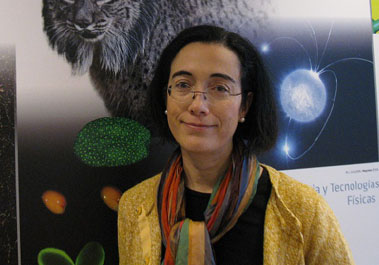
Interview with ANA MARÍA MANCHO
Ana María Mancho Sánchez is a Staff Scientist at the Institute of Mathematical Sciences (ICMAT). Principal Investigator of several research projects, both national and international, she has directed seven doctoral theses, which were rewarded in Spain and abroad. She is an Executive Editor of the journal “Nonlinear Processes in Geophysics” and a member of the Scientific Advisory Committee of Science Europe, an association the CSIC belongs to. Furthermore, she is an evaluator in several agencies and for the European Union she was an expert in the Marie Sklodowska Curie projects (Individual Fellowships and Training Networks).
Do you come to Brussels often? Why do you visit us this time?
I do, lately. I have been in Brussels several times and next year I think I´ll come here about four times. This time I came to one of the meetings that the Science Advisory Committee (SAC) of Science Europe holds here in Brussels annually. Moreover, I have participated in the SAC Symposium “Building a Scientific Narrative on Societal Impact and the Value of Science”, which took place at the legendary Metropole Hotel, where the first Solvay congress was held, in 1911.
What does your work entail as a member of the Scientific Advisory Committee of Science Europe?
First of all, it involves explaining what Science Europe is. It is an organisation, based in Brussels, composed of institutions of the world of research, which either fund or conduct research, from 27 European countries. The goal of Science Europe is to provide a common and strong voice to their member organisations before the European Union and their own governments.
Within Science Europe, the Science Advisory Committee represents the scientific community and advises the Government Board and the General Assembly from the perspective of “end user” of the scientific policies.
What are benefits of your participation in this committee for you, in particular, and for the CSIC, in general?
At the personal level, it is a very rewarding experience. The members of the SAC come from all the fields of Science and Human Studies and from many European countries, thus this experience allows me to explore important topics of scientific policy. It also gives me the possibility to provide constructive ideas about these topics from my research experience, in our country and abroad.
I think it is good for the CSIC that there are researchers of the CSIC in this committee. Currently, in the SAC we have two researchers of the CSIC, Marián Gomez-Fatou and me.
Could you summarise your experience as an expert evaluator of Marie Sklodowska Curie projects: Individual Fellowships and Training Networks?
Being an evaluator of Marie Sklodowska Curie projects is a very demanding task. It is a great responsibility to evaluate with rigour proposals in which other people have put so much effort and dedication. On the other hand, it is very instructional to read projects with the perspective of an evaluator, since one gains experience to write them in the future in a competitive way.
Would you recommend other scientists of the CSIC to participate as expert project evaluators? Why?
I would, undoubtedly, for many reasons. I have described one of them already: it allows to gain experience to write competitive projects. This is not only from your evaluation, but also because you get to know the evaluations of other experts. Besides, if your presence in Brussels is required, you can expand your professional contacts in your area by meeting evaluators from all around the world.
Do you currently have any plan to be part of/coordinate a European project?
Yes. I currently have numerous meetings with several partners, in which we are planning to apply for a European project, within the calls of industrial leadership, in the space-Earth observation programme.
